On the morning of July 13, in Can Tho, Politburo member and Prime Minister Pham Minh Chinh chaired a conference on the implementation of the two-level local government model; the progress of key transport projects; and the project on sustainable development of 1 million hectares of specialized rice in the Mekong Delta.
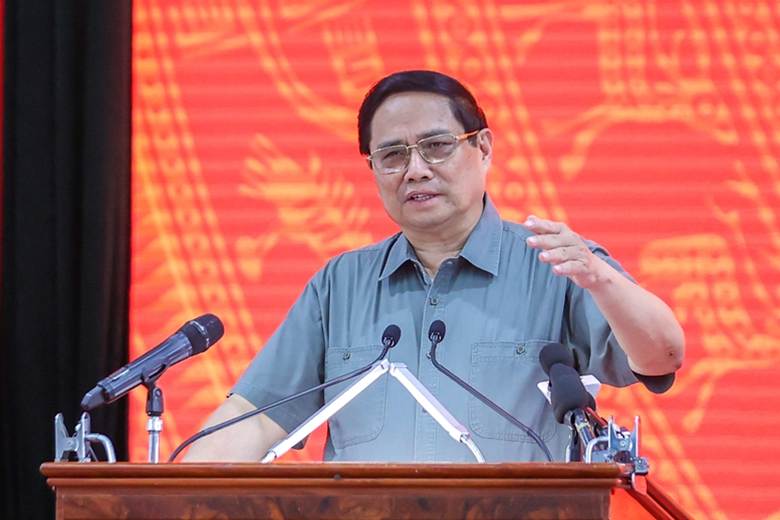 |
| Prime Minister Pham Minh Chinh emphasized: The Mekong Delta needs to be more united, make breakthroughs, and move faster - Photo: VGP/Nhat Bac |
Also attending the conference were: Deputy Prime Minister Tran Hong Ha; Minister of Home Affairs Pham Thi Thanh Tra; Minister of Construction Tran Hong Minh; Minister of Finance Nguyen Van Thang; Minister of Industry and Trade Nguyen Hong Dien; leaders of central ministries and branches; Secretaries and Chairmen of People's Committees of provinces and cities in the Mekong Delta region including: Can Tho, Vinh Long, Dong Thap, An Giang, Ca Mau; leaders of Ho Chi Minh City, Dong Nai and Tay Ninh provinces.
The initial implementation of the two-level local government system was quite successful and smooth.
Reporting to the Prime Minister and informing him about the implementation of the two-level local government model, Minister of Home Affairs Pham Thi Thanh Tra said that over the past time, localities have urgently implemented the model in accordance with the direction of the Politburo, the Government and the Prime Minister. The implementation since July 1 has been methodical, serious, on schedule and achieved the set goals.
The Minister acknowledged that the provinces and cities in the region have quickly stabilized their administrative apparatus after the reorganization, especially at the provincial and communal levels. The process of organizing and assigning staff has been carried out flexibly and carefully, ensuring no interruption in serving the people and businesses.
Minister Pham Thi Thanh Tra also highly appreciated the proactiveness of localities in resolving policies and regimes for officials who have resigned or quit their jobs according to regulations; at the same time, actively receiving and implementing decentralization and delegation of authority from the Central Government. Many localities, such as Ho Chi Minh City and Can Tho, have had creative ways of handling administrative procedures, bringing about positive results.
"It can be affirmed that the initial results were quite successful and smooth, without major problems arising in the operation of the two-level local government apparatus," the Minister emphasized.
All of these demonstrate the sense of responsibility, exemplary behavior, determination and great efforts from the local leadership team to ensure that the two-level local government operates effectively and better serves the people and businesses in the recent short time.
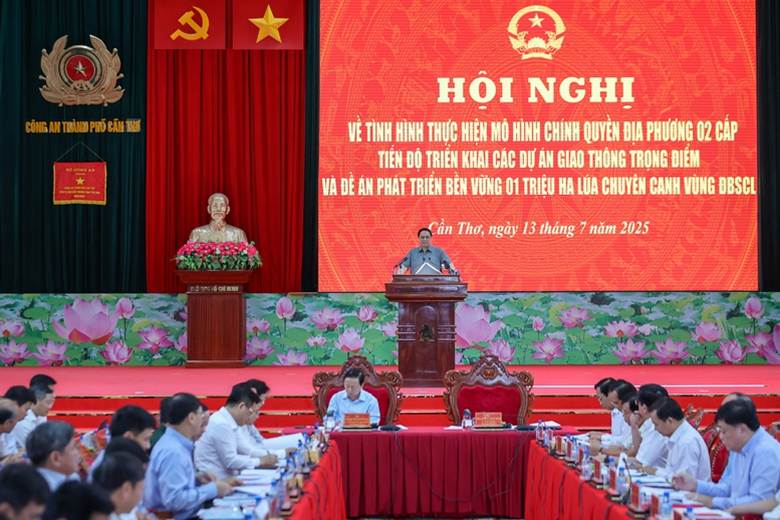 |
| The Prime Minister especially emphasized 4 goals and requirements, in the remaining months of 2025, agencies, units and localities need to consolidate and strengthen solidarity and unity to overcome themselves, contributing to achieving all the goals set in 2025 and the entire term - Photo: VGP/Nhat Bac |
Rach Mieu 2 Bridge, completed 6 months early, reducing costs by nearly 50%
Minister of Construction Tran Hong Minh said that the Southern region is implementing 21 key transport projects. Of these, 13 projects will be completed in 2025 with a total length of 354 km. The Ministry of Construction is the managing agency for 6 projects, and localities are the managing agencies for 7 projects; 8 projects will be completed after 2025 with a total length of more than 294 km. Of these, the Ministry of Construction is the managing agency for 3 projects; localities are the managing agencies for 5 projects.
In addition, the Ministry of National Defense is preparing to invest in 3 projects with a total length of 98 km. These are 2 component projects of the Ca Mau - Dat Mui expressway and the connecting road to Hon Khoai port. These projects are expected to start construction on August 19, 2025.
According to the Minister of Construction, recently, the Ministry has regularly inspected the site, urged and directed investors and contractors to increase human resources and equipment, organize construction in "3 shifts, 4 teams" and transfer the workload of slow contractors to speed up progress.
Through direct inspection on July 12, it was found that, to date, the projects have had significant changes. Among them, the Rach Mieu 2 Bridge project was completed 6 months ahead of schedule. This is a great achievement of the construction industry, contributing to a cost reduction of nearly 50%.
As for the Can Tho - Ca Mau expressway, the project's progress is currently improving positively, with contractors committed to completing it on December 19 as directed by the Prime Minister.
Regarding the railway sector, the Minister of Construction said that the Ministry has assigned the My Thuan Project Management Board to perform the investor's task of preparing a pre-feasibility study report for the investment project to build a railway line from Ho Chi Minh City to Can Tho. The Board is completing the report to the Ministry to submit to the Prime Minister in September 2025.
In the aviation sector, Ca Mau Airport broke ground for expansion and upgrading in April 2025. It is expected that construction of runways, taxiways, aircraft parking lots and airport support facilities will begin in August 2025.
At the conference, Minister Tran Hong Minh proposed that the Prime Minister direct localities to speed up site clearance for projects in Ho Chi Minh City, Can Tho, An Giang, Dong Thap, Ca Mau, Dong Nai, and Tay Ninh.
For projects managed by local authorities, investors strictly control progress, address material needs, proactively apply technical solutions according to the guidance of the Ministry of Construction to reduce loading time waiting for settlement, finish loading early, and complete the project according to the set plan.
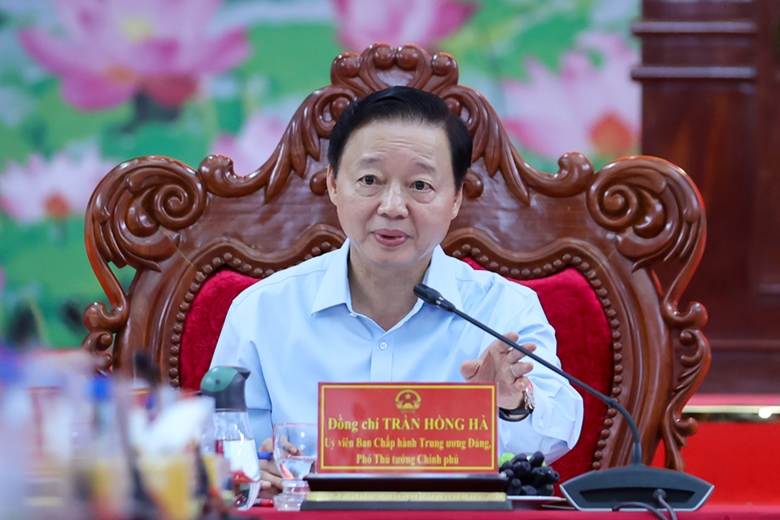 |
| Deputy Prime Minister Tran Hong Ha speaks at the conference - Photo: VGP/Nhat Bac |
The 1 million hectare rice project brings clear benefits
Regarding the 1 million hectare rice project, according to reports, up to now 12/12 provinces have registered to participate in the project with a total area of 1.015 million hectares.
Since 2024, 7 pilot models have been implemented to implement the emission reduction farming process with an area of 50 hectares/model in the two Summer-Autumn and Autumn-Winter crops in 5 provinces. Initial results show that the high-quality, emission-reducing rice farming model brings clear benefits both economically and environmentally.
Production costs are reduced by 8.2-24.2%, the amount of seeds is reduced by 30-50%, the amount of chemical fertilizer is reduced by 30-70 kg of fertilizer/ha, the amount of pesticide spraying is reduced by 1-4 times and the amount of irrigation water is reduced by 30-40%. At the same time, productivity increases by 2.4-7.0%, increasing farmers' income by 12-50% (equivalent to an increase of 4-7.6 million VND/ha compared to traditional farming). Greenhouse gas emissions are reduced by an average of 2.0-12.0 tons of CO₂ equivalent/ha. Enterprises are committed to purchasing rice at a price 200-300 VND/kg higher.
From the 2025 Summer-Autumn crop, continue to implement 6 old models (except the rice-shrimp model) and expand 5 new models. It is expected that the harvest will be completed in the models at the end of August and the beginning of September.
In addition to the above central models, localities have proactively deployed 101 pilot models with a total area of 4,518.3 hectares. As a result, the amount of seeds, fertilizers, pesticides, and water has been reduced according to the Project's objectives.
Regarding production linkage, cooperatives and cooperative groups participating in the Project have been identified (620 cooperatives in phase 1 and about 1,300 cooperatives by 2030). The information data system of 620 cooperatives participating in the Project is being built and updated, creating a foundation for connecting, supporting and monitoring the implementation process, ensuring transparency and efficiency in implementing the goal of sustainable development of the rice industry. In addition, a list of nearly 200 enterprises participating in the Project has been identified so far, of which about 40% are agricultural product consumption enterprises with a linkage scale of 200 hectares or more.
In early 2025, Vietnam exported 500 tons of rice labeled "Low-emission Vietnamese Green Rice" to Japan, opening up a new prospect for the Vietnamese rice industry.
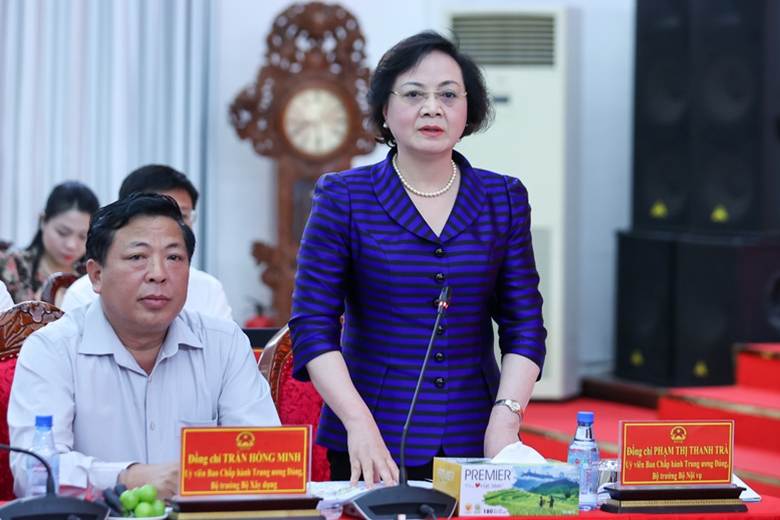 |
| Minister of Home Affairs Pham Thi Thanh Tra reports on the implementation of the two-level government - Photo: VGP/Nhat Bac |
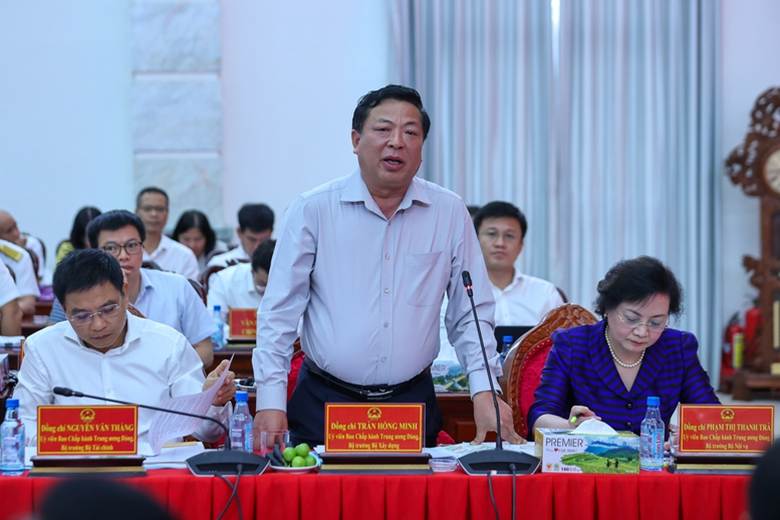 |
| Minister of Construction Tran Hong Minh said that the Southern region is implementing 21 key transport projects - Photo: VGP/Nhat Bac |
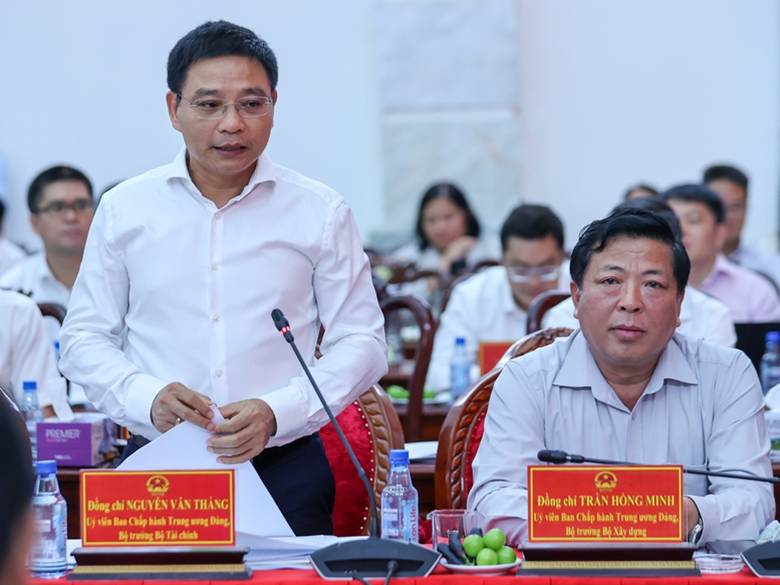 |
| Minister of Finance Nguyen Van Thang speaks at the conference - Photo: VGP/Nhat Bac |
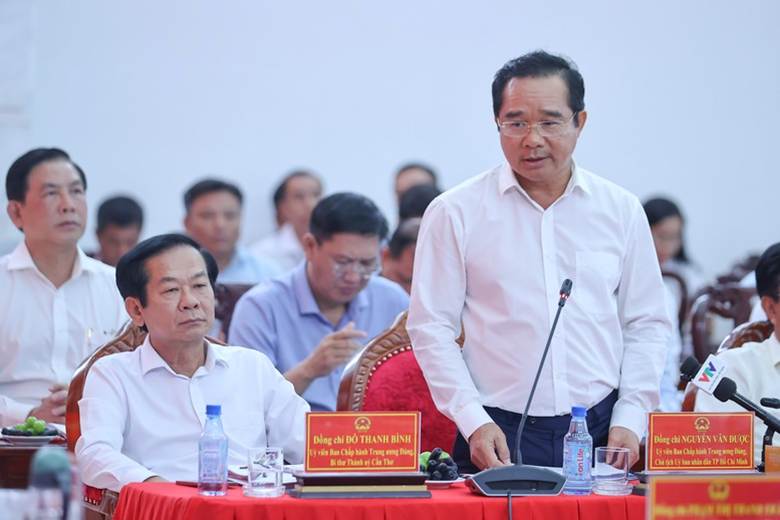 |
| Chairman of Ho Chi Minh City People's Committee Nguyen Van Duoc speaks at the conference - Photo: VGP/Nhat Bac |
Completion of Can Tho Oncology Hospital in 2026
In his concluding remarks, Prime Minister Pham Minh Chinh assigned the Government Office, ministries, branches and localities to synthesize and absorb all opinions, complete and soon submit to the Prime Minister the Conference Conclusion Notice for unified implementation.
In particular, the Conclusion Notice focuses on implementing 3 main groups of tasks, including tasks related to organizing local governments at 2 levels; tasks of implementing strategic infrastructure projects in the Mekong Delta connecting the Southeast region, Ho Chi Minh City, international connections by air, sea, road, and river; tasks related to the 1 million hectare high-quality rice project. Along with that are tasks related to implementing key projects for the 2027 APEC Summit Week in Phu Quoc and Can Tho Oncology Hospital, implementing projects to combat climate change in the Mekong Delta.
Assessing the results achieved from May 2025 (when the Prime Minister met with voters in the Mekong Delta) to date, the Prime Minister stated that the implementation of the two-level local government has been basically good, the relevant agencies have implemented it firmly, systematically, gradually completed it and are operating stably. However, many contents still need to be reviewed, implemented more synchronously and professionally, ensuring more smoothness, openness and convenience for people, businesses, Party committees, authorities, the Vietnam Fatherland Front and socio-political organizations.
Regarding key transport projects in the Mekong Delta connecting with the Southeast region and internationally, reports show that they are basically on schedule, many projects are ahead of schedule, especially projects undertaken by the Ministry of Construction and completed in 2025, including Long Thanh airport, Rach Mieu 2 bridge, Dai Ngai bridge, etc. The North-South expressway is completing ahead of schedule; many sections of the East-West expressway are likely to be completed this year.
In addition, there are still shortcomings and limitations in raw materials. The Prime Minister stated that all projects need to be accelerated, breakthroughs, shortened time, ensuring quality, safety, efficiency, and environmental hygiene.
Regarding the 1 million hectare rice project, the provinces have implemented it with the active response of businesses, cooperatives, and farmers, and so far, we have achieved initial but very positive and important results.
The Prime Minister emphasized that "all beginnings are difficult", this is the first 1 million ha high-quality, low-emission rice program in the world. The project is of great significance in proactively and actively ensuring food security for Vietnam and its partners around the world, stabilizing output, avoiding "good harvest, low price, good price, bad harvest" for Vietnamese rice, improving productivity, quality and farming efficiency. Along with that, the project contributes to responding to climate change, drought, subsidence and landslides in the Mekong Delta; creating jobs and livelihoods for people; promoting science and technology, innovation, digital transformation; creating regional and international links in the supply chain, diversifying markets, products and supply chains; enhancing the national brand and Vietnamese rice brand.
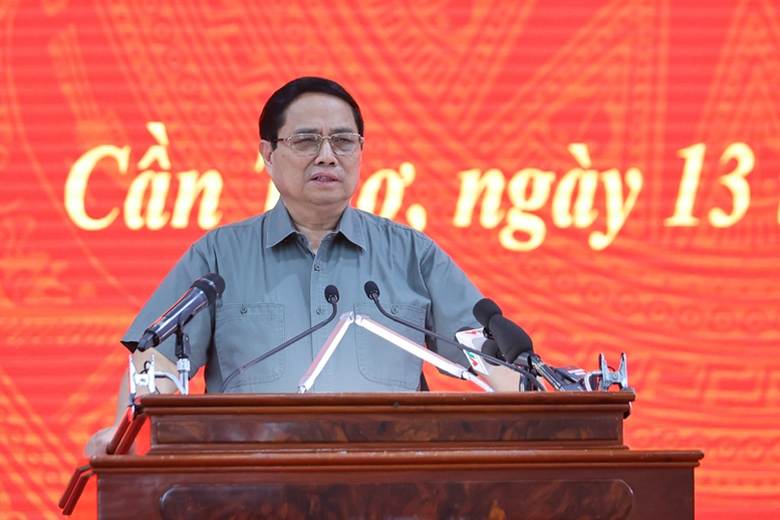 |
| The Prime Minister assigned the Government Office, ministries, branches and localities to synthesize and absorb all opinions, complete and soon submit to the Prime Minister the Notice of Conference Conclusion for unified implementation - Photo: VGP/Nhat Bac |
2-level operation is smooth and perfect as possible
Regarding the goals for July, the third quarter and the remaining months of 2025, the Prime Minister requested to consolidate and strengthen solidarity and unity, accelerate, break through, and be even faster to surpass ourselves, "turn nothing into something, turn difficult into easy, turn impossible into possible", contributing to achieving all the goals set for 2025 and the entire term.
The Prime Minister especially emphasized four goals:
Firstly, economic growth from 8% by 2025, macroeconomic stability, inflation control, ensuring major balances;
Second, maintain national defense and security, social order and safety, a peaceful, cooperative and developing environment;
Third, quickly stabilize and operate the two-level local government as smoothly and perfectly as possible;
Fourth, complete the goal of eliminating temporary and dilapidated houses before August 31, 2025, including eliminating temporary and dilapidated houses for people with meritorious services before July 27, promoting the spirit of "whoever has something to help, whoever has merit helps merit, whoever has property helps property, whoever has little helps little, whoever has a lot helps a lot".
Specifying groups of tasks and solutions for implementing the two-level government, the Prime Minister requested to continue to closely follow and resolutely and effectively implement Conclusion No. 177-KL/TW dated July 11, 2025 of the Politburo, the Secretariat and the direction of General Secretary To Lam on continuing to build the organization and operation of two-level administrative units to ensure smoothness and direction of the Government and the Prime Minister.
In particular, focusing on arranging a full staff, preparing cadres for Party congresses at all levels, flexibly applying a number of criteria and standards; preparing documents for Congresses at all levels; resolving administrative procedures for people and businesses, avoiding congestion and negativity; ensuring medical examination and treatment for people, not leaving patients without a place to be treated; building boarding schools for students in border areas, remote areas; completing digital infrastructure, especially in difficult places, especially electricity and digital infrastructure.
Regarding key projects, the Prime Minister emphasized the spirit of overcoming the sun and rain, not losing to storms and winds, eating and sleeping quickly, only working, not backtracking, working day and night, working overtime on days off. The entire political system must get involved, leaders must regularly inspect and urge, the government must remove legal obstacles, the Fatherland Front and socio-political organizations must participate in what can be done, supporting food, drinks, fruits, etc., not leaving contractors, cadres, workers, and laborers alone on the construction site. Contractors mobilize and cooperate with local contractors and businesses. The Ministry of Construction provides guidance on norms, unit prices, and techniques; the Ministry of Agriculture and Environment provides guidance and immediately handles difficulties in construction materials. Agencies are preparing to inaugurate projects on August 19, 2025 such as Rach Mieu 2 Bridge, Dai Ngai Bridge, etc.
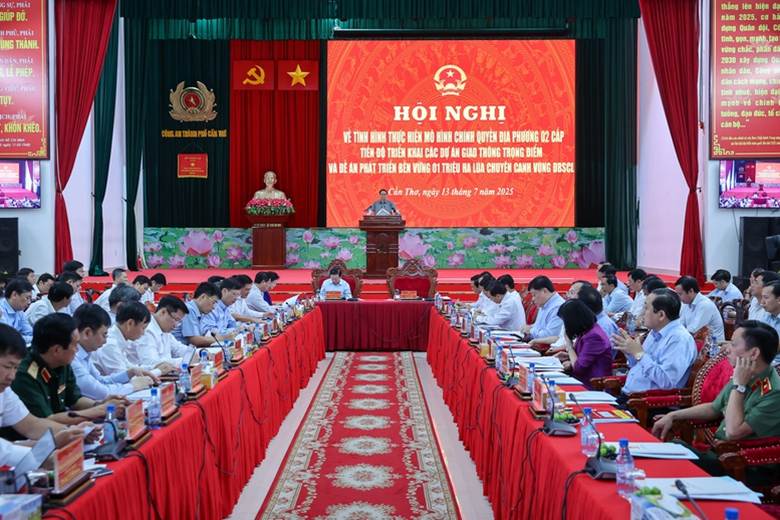 |
| The Prime Minister requested that projects serving APEC in Phu Quoc must be built quickly, beautifully, and worthy of the culture, position, and role of the country and the intelligence of the Vietnamese people; the Can Tho Oncology Hospital project must be completed in 2026 - Photo: VGP/Nhat Bac |
Regarding the 1 million hectare rice project, the Prime Minister requested to complete related planning in the third quarter of 2025; build a Vietnamese rice brand, develop new brands, along with existing famous brands such as ST25.
The State Bank implements preferential credit policies; the Ministry of Finance resolves issues related to capital sources from international organizations; the Ministry of Industry and Trade negotiates, signs, and immediately implements agreements on rice; enterprises supply input materials for production, ensuring output.
The Ministry of Science and Technology contributes to building brands, designs, and packaging that are imbued with national cultural identity, attractive, and easily recognizable; promoting the connection between the four parties: the State, businesses, schools, and farmers.
Localities proactively guide and implement tasks according to their functions, tasks and powers; ministries, agencies and localities closely and effectively coordinate with the Ministry of Agriculture and Environment.
Regarding some other important projects, the Prime Minister requested that projects serving APEC in Phu Quoc must be built quickly, beautifully, and worthy of the culture, position, and role of the country and the intelligence of the Vietnamese people; complete the construction of a waste treatment center, environmental sanitation center, clean water center, and traffic connecting with projects serving APEC; and orientate to serve both APEC and long-term development.
Regarding the Can Tho Oncology Hospital project (with a total investment of VND 1,727 billion from ODA capital and domestic counterpart capital, started in 2017 but has been delayed and not yet completed), the Prime Minister directed an inspection, the Ministry of Finance to preside over the arrangement of public investment capital to restart the project, assign Can Tho as the investor and must complete it in 2026.
According to Ha Van/Chinhphu.vn
Source: https://baovinhlong.com.vn/thoi-su/202507/thu-tuong-dbscl-can-doan-ket-hon-nua-but-pha-than-toc-hon-nua-f5531a8/



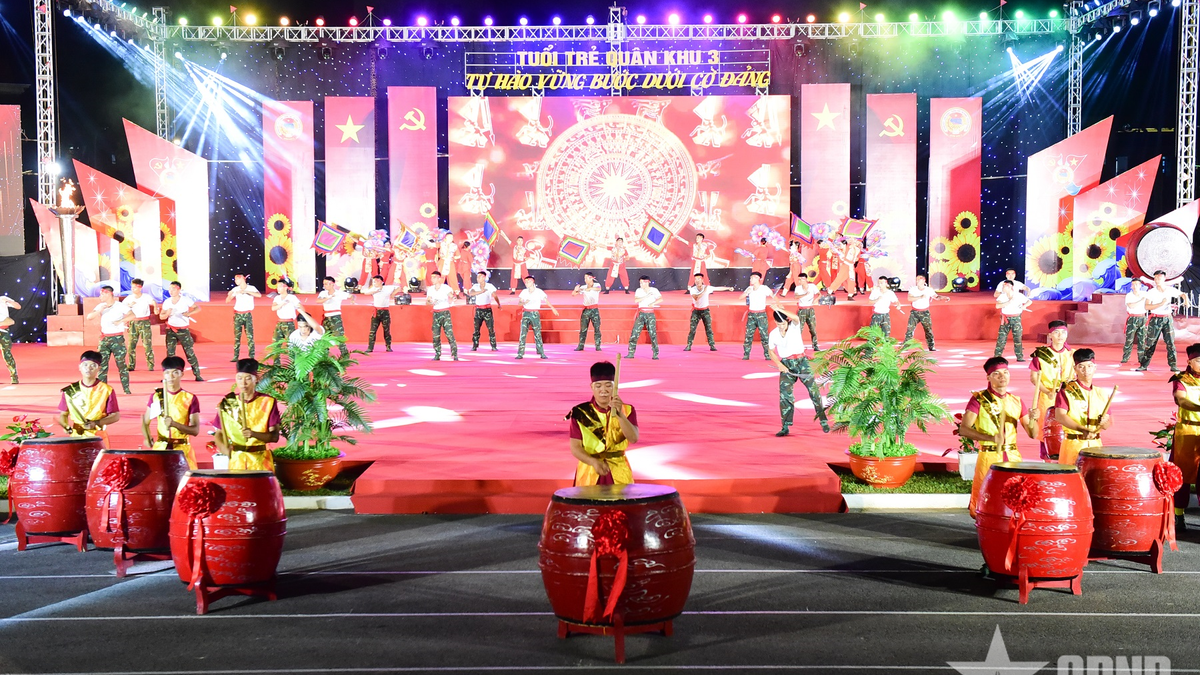
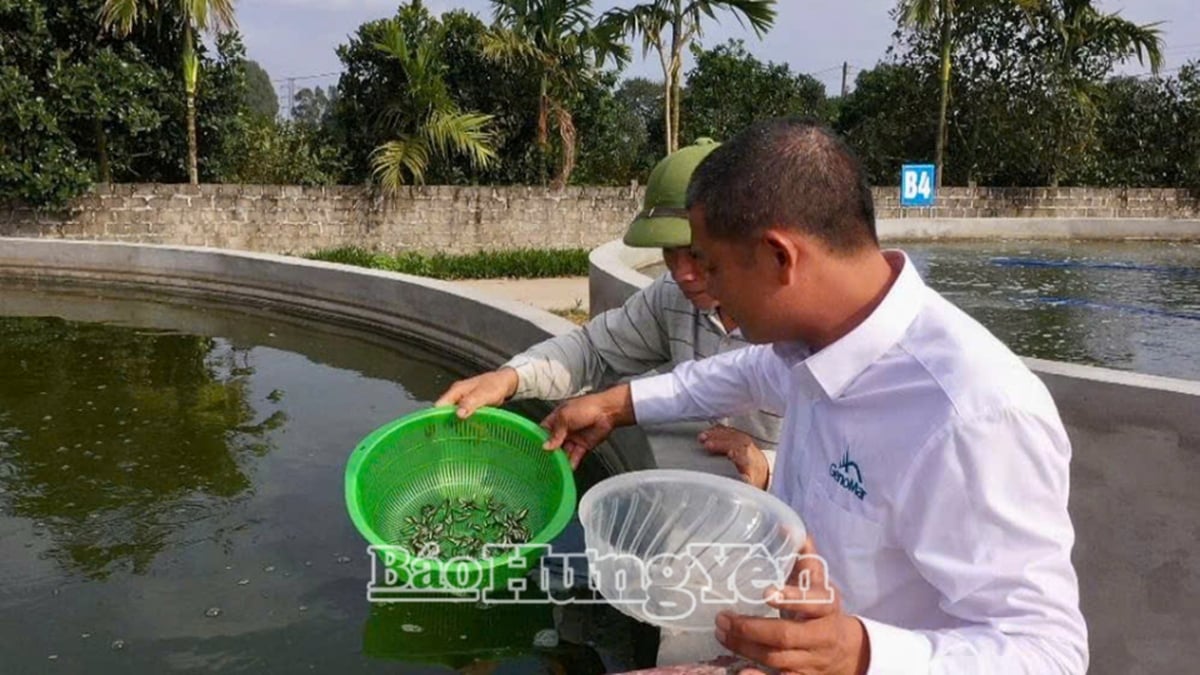
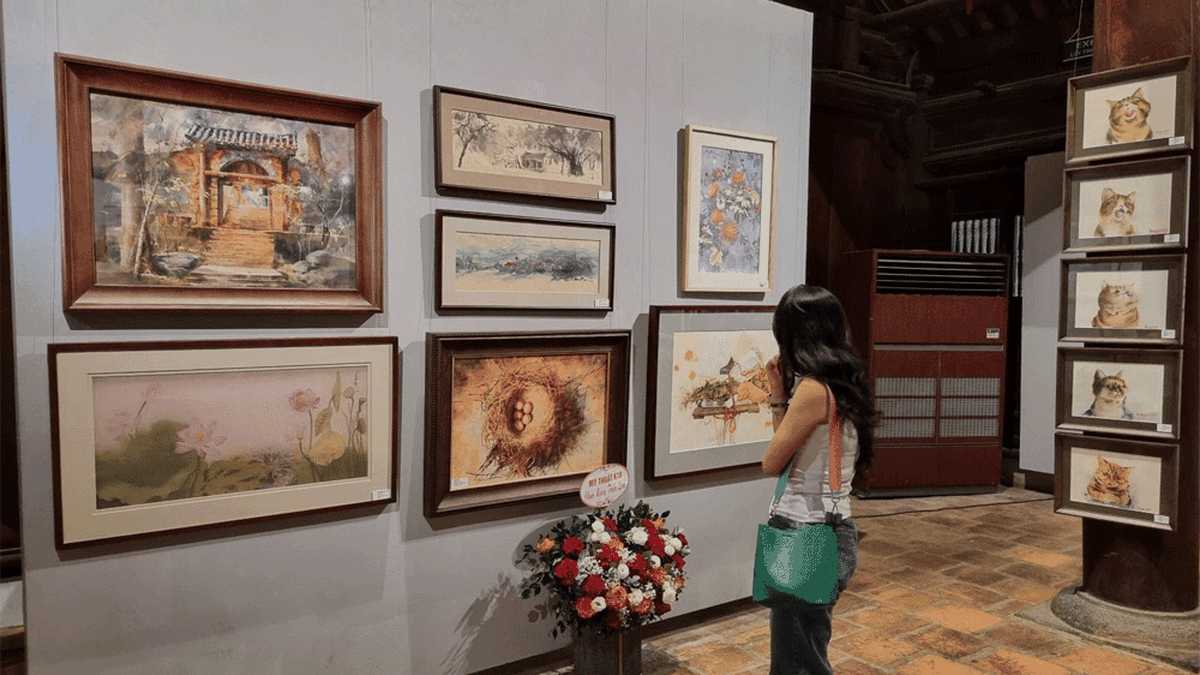
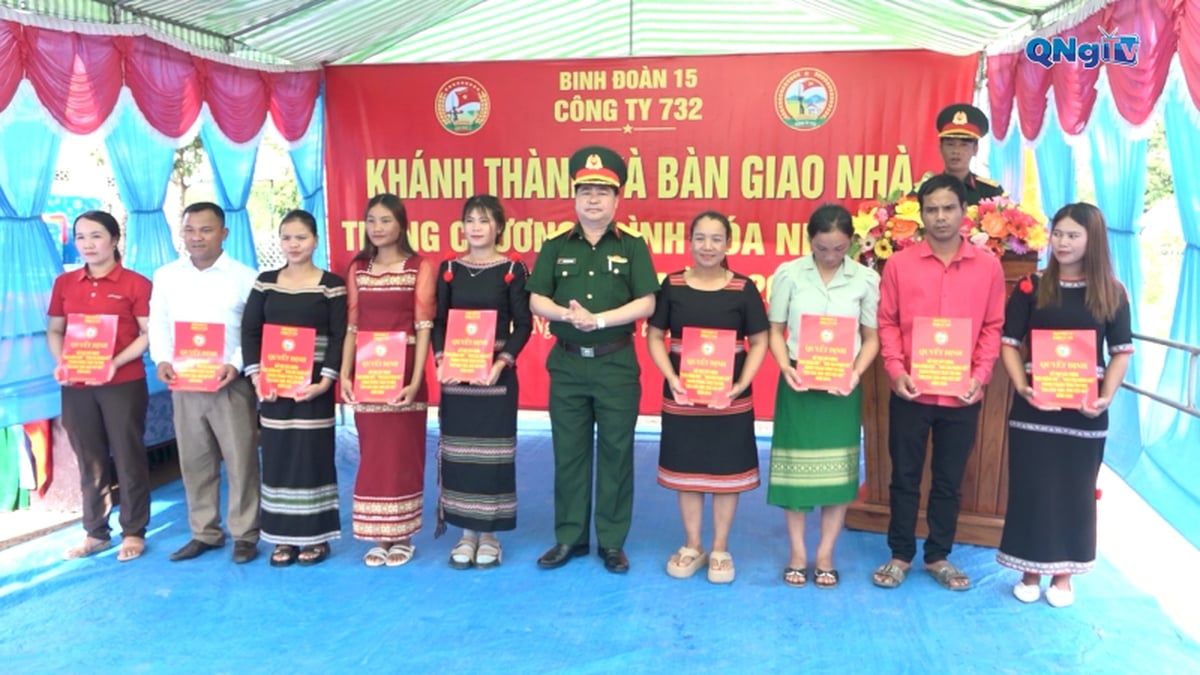
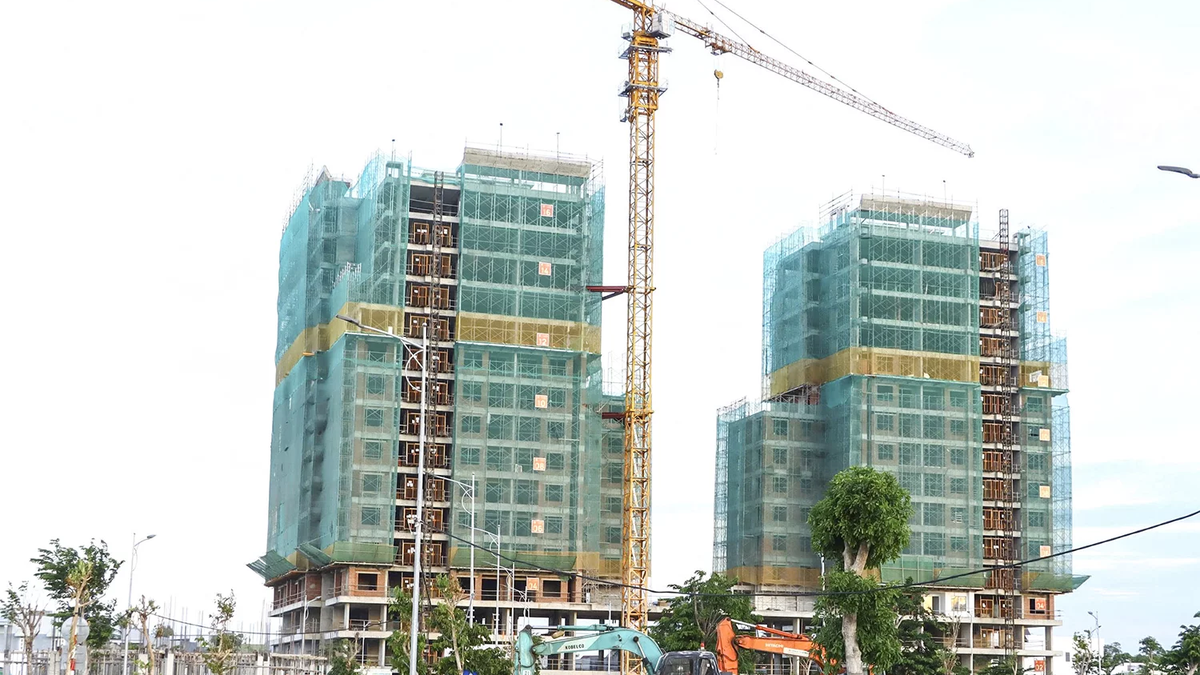

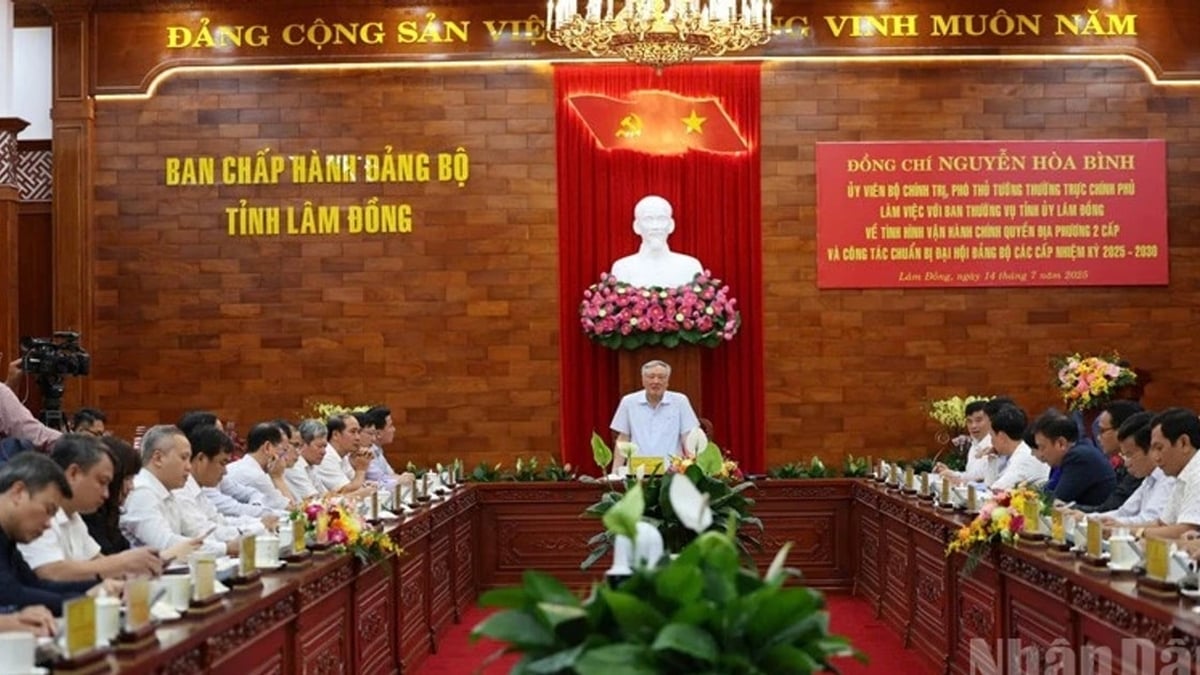
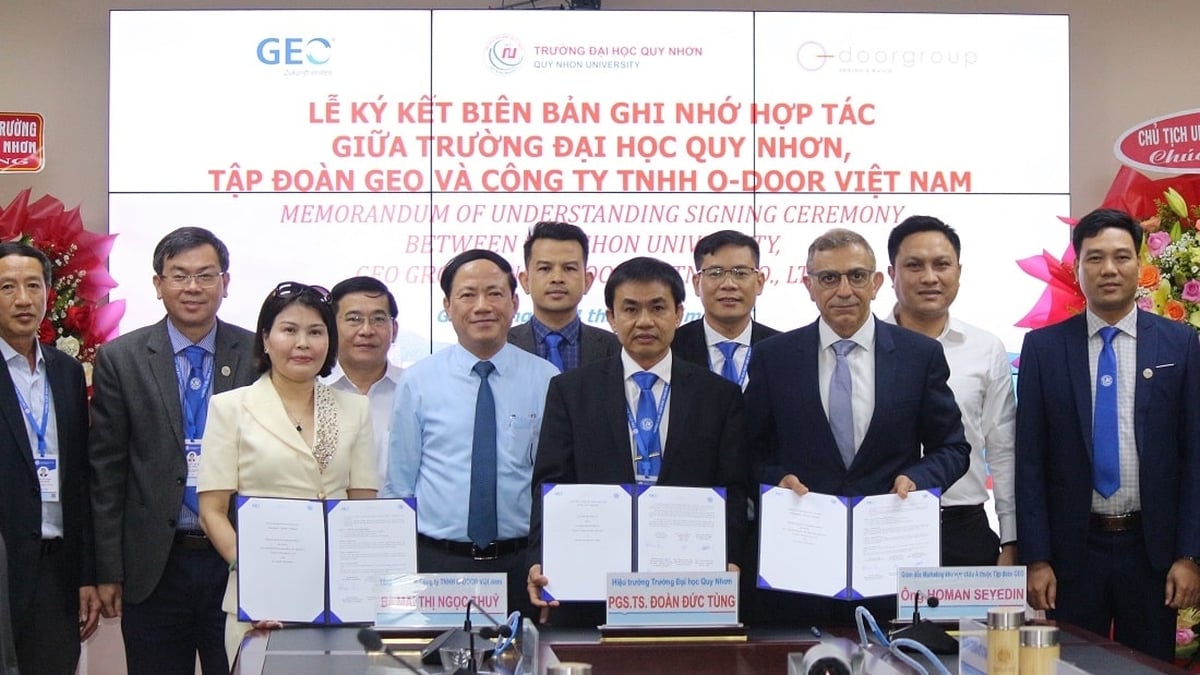
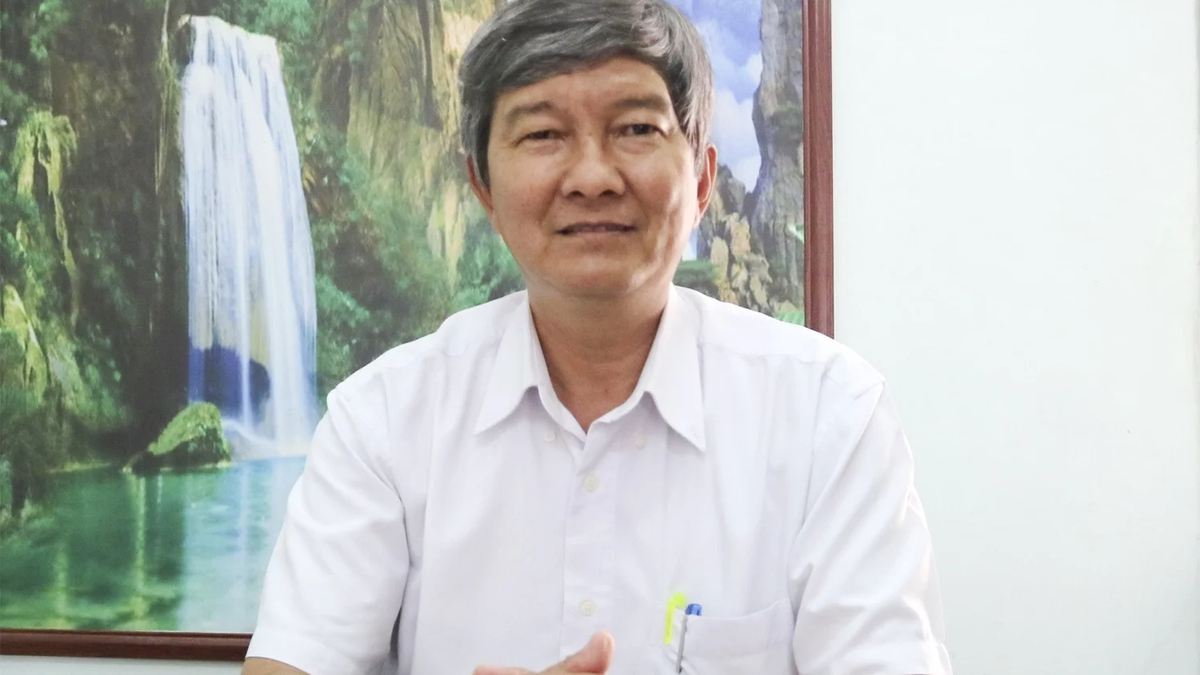







































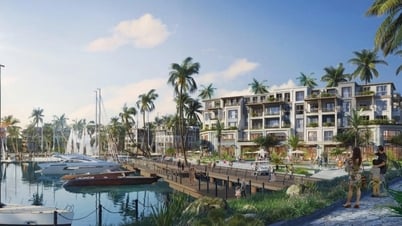
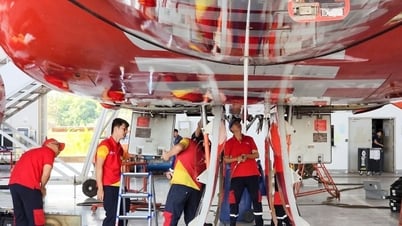

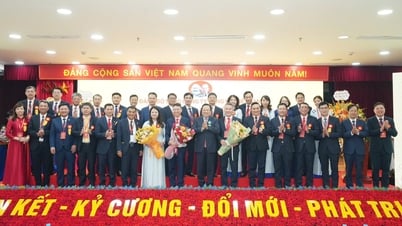



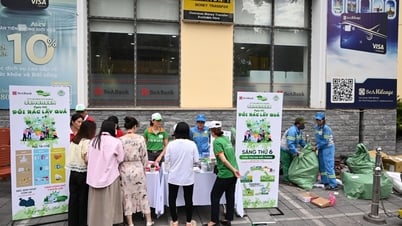

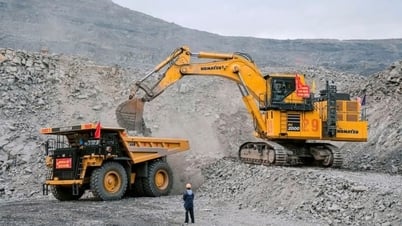
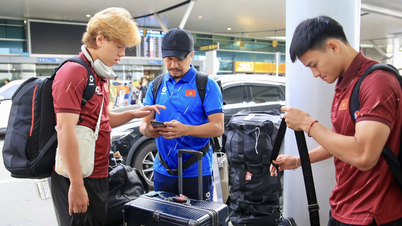


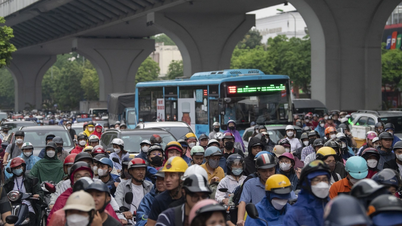
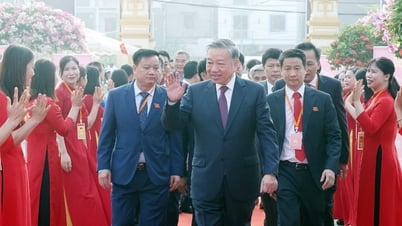
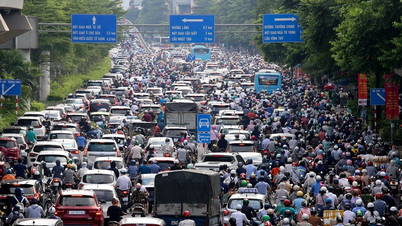
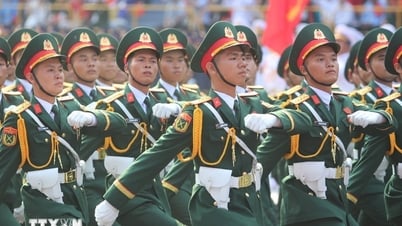
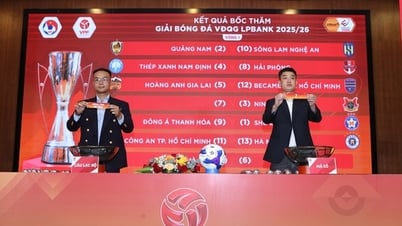

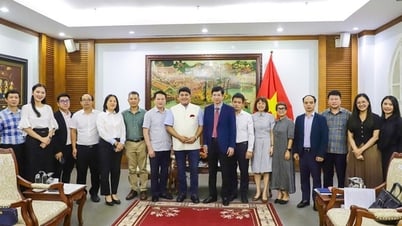

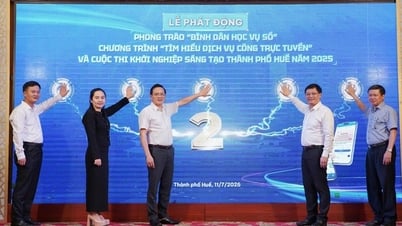




























Comment (0)